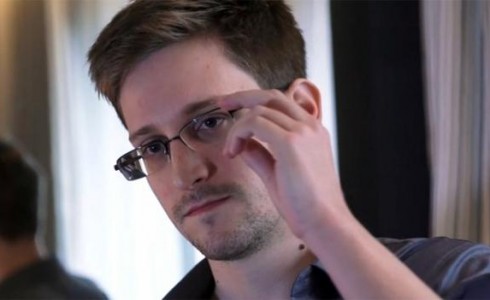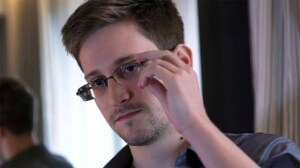Movie a Day Blog is well on its way to its goal of posting on every film nominated for the Academy Awards this year, in every category. (Look in the Movie a Day Blog Archive for previous posts.) Much work awaits, but the effort is rewarded by a film such as CITIZENFOUR (2014, Theatrical).
This documentary by the very brave filmmaker Laura Poitras captures that rarity: history literally in the making. By meeting and taping the great document de-classifier of the 21st century, Edward Snowden, in Hong Kong just after he released millions of documents, Poitras has a camera trained on a critical event in the modern rebellion against government surveillance.
The gravity of the moment, and the cat and mouse exchanges between Poitras, Snowden and the American journalist Glenn Greenwald, are the equal of any contemporary espionage movie, and for me, brought back memories of Carol Reed’s THE THIRD MAN (1949), set in post-World War II Vienna; somehow Hong Kong serves well as its modern equivalent.
One can debate whether Snowden is a hero or a villain, a guardian of personal liberty or a traitor who severely comprised national security. There are valid arguments to be made for both positions, although I tend strongly toward the former description, and think President Obama has acted vindictively and wrongly toward Snowden, as much out of embarrassment as betrayal.
Poitras doesn’t deify her subject; Snowden comes off as slightly pedantic and extremely thoughtful in the planning and staging of his document dumps. Suddenly a series of fire alarms suddenly goes off in the hotel room where Snowden is monitoring the progress of his actions and the government’s response. As the camera rolls, Snowden visibly freaks out; he becomes jumpy and skittish, imagining that American agents are going to storm his hotel room and find a convenient excuse to assassinate him and end his ability to reveal more government secrets.
No such thing happens, of course, but the tension supplied by real-time events proves every bit as suspenseful as some fictional equivalent, such as DAY OF THE JACKAL (1973), which traded in the same kind of dramatic tension of waiting for real events to overtake carefully planned ones. CITIZENFOUR makes clear that Snowden carefully planned every detail of his actions to unmask secret government surveillance of not only the entire American populace, but many overseas peoples and their leaders.
It is the first real evidence of the massive level of spying that we are all now clearly subject to: in our email, our cellphone conversations, our web searches and our most personal practices.
When Poitras started getting anonymous encrypted emails from someone calling himself CITIZENFOUR in January 2013, she was both intrigued and cautious. She did not want to be used for someone else’s agenda, but this unknown source was telling her that he had voluminous evidence that the National Security Agency, in collaboration with other intelligence agencies worldwide, was running a massive illegal covert surveillance program.
Poitras, who has previously been nominated in the Best Documentary Feature category as she now is for CITIZEN FOUR, is known for hard-hitting social documentaries such as THE OATH (2010) and several of the best episodes on the PBS series “POV.”
Working closely with journalist Greenwald, an American who lives in Brazil and works for the British investigative paper The Guardian, and another reporter Ewen MacAskill (a properly skeptical Scotsman), Poitras films Snowden’s doubts as well as his self-righteousness. He is convinced he is a modern martyr, and it doesn’t surprise him when the U.S. government forces Hong Kong to either arrest him and extradite him immediately back to the United States, or expel him.
We follow Snowden as he quickly packs, fools the journalists frantically trying to track his escape route, and ends up marooned in the Moscow airport. There is actually footage near the end of the documentary that shows Snowden and his girlfriend in the window of their anonymous Moscow apartment. How long will he remain in Russia? Maybe no one other than Vladimir Putin can answer that question, but as long as Snowden remains out of the clutches of the CIA, FBI, NSA and an entire roster of alphabet security agencies, he’s a beacon of freedom of speech and a whistle-blower extraordinaire.
Snowden is not the only one courting danger. Greenwald’s spouse, a gay Brazilian man, was held incommunicado for hours by British security officials when attempting to leave England. Poitras had to move to Germany to make sure she was not vulnerable to arrest or a subpoena to provide all of her digital footage of Snowden to the American government.
Again, you can think of Snowden what you will, but I feel he, Poitras and Greenwald did all Americans a tremendous service by presenting how and why Snowden exercised his conscience. There are no secrets revealed in this documentary other than the one that has maddened the U.S. security apparatus: how Edward Snowden got away with what he did.
CITIZENFOUR is more than just an Oscar-nominated documentary; it’s a vivid telling of a dangerous and chilling story, one that continues to unfold without our knowledge and without another Edward Snowden around to clue us in.



Comments are closed